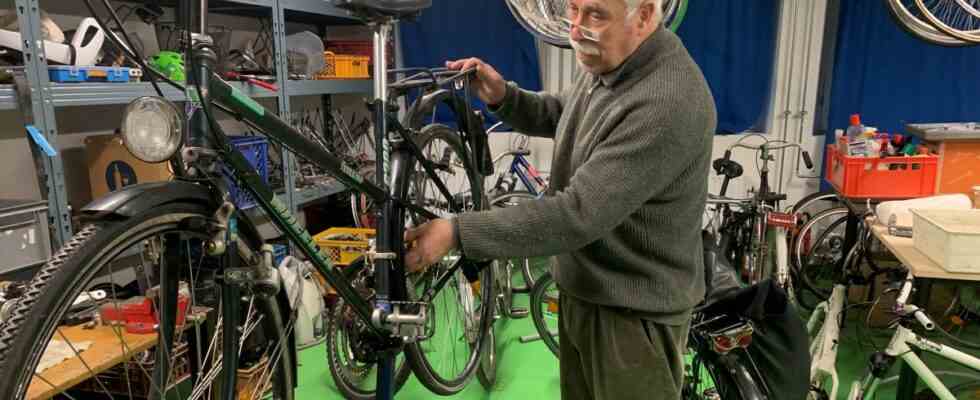Bicycle corpses are piled up along the wall of house number eight on the site of the former Bayern barracks. Together with a team of volunteers, Manfred Heidemann brings them back to life, so to speak, and gives them to refugees and homeless people on favorable terms. The Radl workshop for refugees and homeless people has been in the Bayern barracks for a good ten years. Today it is in the basement of one of the pale yellow houses inhabited by refugees. It is clear to the operators of the bicycle workshop that the demolition of the buildings in the old Bavarian barracks in favor of the Neufreimann quarter that is already being created will also mean that the bicycle workshop will disappear there. But at the end of August 2022, the city of Munich canceled the license agreement that had been signed just over a year and a half earlier, which would actually allow the volunteers to stay in the workshop until the end of 2023.
The reason: During an inspection, it was found that the current use of the building did not correspond to the “building permit/extension of use”. The city of Munich also “urgently needs storage space in the context of the war of aggression against the Ukraine, which it might want to accommodate itself in Building 8”.
“We don’t want any arguments and we hope that we can stay here until it’s demolished,” says Manfred Heidemann, while showing the heart of the site with its pumps and tools, dozens of bicycle tubes and the large compressor. Since the letter from the municipal department, the retired lawyer has had a heated e-mail exchange with Tanja Peikert, head of real estate services in the state capital. Peikert wrote to Heidemann and offered containers in the inner courtyard of a neighboring building as an alternative and sought to talk to the association. The containers in the courtyard of house 14 are out of the question for Heidemann. They are not heated, are also located in the construction site zone and are therefore not accessible to the public.
In addition, Heidemann never saw the conditions of use of the building permit, which according to the report were not met. “We only want a personal appointment when we see the documents,” he says. On request, the municipal department responds to some of the allegations and writes: Heidemann refused access to the construction file and several meetings. The containers are also heated. Whether the proposed location is accessible is not answered. When Heidemann recently rang the bell at the locked door of the fenced-in courtyard during a tour, no one answered. It seems that the communication between the city and the bicycle repair shop is not running smoothly at all.
Without volunteers there would be no repaired bikes.
(Photo: Florian Peljak)
A good 200 donated bikes are currently housed in five rooms in the basement of house eight. A homeless helper, who wishes not to be named, is here almost every day. He is a qualified electrician and makes the bikes roadworthy for spring during the cold season. The workshop uses a deposit system to lend children’s bikes for five euros and adult bikes for 20 to 40 euros. For comparison, a single ticket for Munich public transport currently costs 3.70 euros, and the reduced “social ticket” for the central zone M costs 31 euros per month. If you don’t return your borrowed bike, you can keep it.
“Ukrainian refugees are also coming at the moment,” says Heidemann. “Sometimes we just give young people the bikes as gifts”. As many people as in 2015, the time of the so-called refugee crisis, would no longer come to the bike workshop. At the moment they add up – on Tuesdays and Thursdays – to 20 to 30 people per month.
It is not yet possible to say whether there is room for a bicycle workshop in Neufreimann
Manfred Heidemann repeatedly emphasizes his gratitude to the city of Munich, and the municipal department is also striving for a solution “in agreement with the bicycle repair shop”. Since January, however, there has been radio silence. The Schwabing-Freimann district committee has not yet commented on the matter. For Chairman Patric Wolf (CDU), however, the bicycle repair shop has “lost sight of its task a little over the years”. After an earlier on-site visit, Wolf found the workshop “not inviting”. The municipal department advocates an amicable relocation and, when asked, argues with concerns about fire protection and the space required for Ukraine aid supplies.
The processing time for a change of use in the current building alone takes nine months – longer than house number eight is probably still there. It is still unclear whether the emerging Neufreimann district will have space for a non-profit bicycle workshop. According to the planning department, cycling in Neufreimann is also being considered, “the exact design is currently being discussed […] In any case, until Manfred Heidemann and the city find a solution, he and his team are still preparing the bikes. After all, spring is just around the corner.

